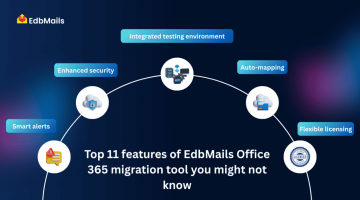Microsoft Office 365 has become the backbone of modern businesses. From emails and calendars to Teams collaboration and SharePoint document management, organizations rely on Office 365 for daily productivity. However, one critical question often arises: Does Office 365 include backup by default?

At first glance, many assume that because their data is in the cloud, Microsoft automatically provides full backup and recovery options. The reality is more complex. While Office 365 delivers uptime and data availability, it does not provide comprehensive backup. To understand why, let’s break down what Office 365 actually offers and what’s missing.
Native data protection in Office 365
Microsoft does include several built-in features that help with basic data protection:
- Retention policies that preserve deleted items for a limited duration.
- Recycle bin and versioning that allow users to recover files for a short window of time.
- Geo-redundancy, where data is stored in multiple datacenters to ensure availability in case of hardware or location-level failure.
These features are valuable for service continuity, but they are not designed to act as a complete backup solution. For example, retention is time-limited and once that period expires, recovery is no longer possible. Geo-redundancy only protects Microsoft’s infrastructure, not individual user data from accidental deletion or malicious activity.
Misconceptions about Office 365 backup
A common misconception among businesses is that Microsoft takes full responsibility for safeguarding customer data. This misunderstanding can be costly.
Microsoft operates under a Shared Responsibility Model. This means Microsoft ensures service availability, security of the infrastructure, and compliance of its cloud platform. However, the responsibility for protecting actual business data—emails, files, and collaboration content—rests with the organization itself.
In practice, if an employee accidentally deletes important files or a malicious insider wipes entire folders, Microsoft will not restore that data for you. Without a proper backup strategy, recovery might be impossible.
What Microsoft provides vs. What’s missing
To make this distinction clearer, here’s what Microsoft delivers:
- Uptime and service availability (99.9% SLA).
- Protection against infrastructure-level failures.
- Short-term retention policies and a recycle bin for deleted content.
And here’s what is missing:
- Granular recovery – the ability to restore a single email, calendar event, or file from a specific point in time.
- Long-term retention – keeping backups beyond the retention period to meet business continuity and compliance needs.
- Ransomware and insider threat recovery – native tools cannot roll back mass encryptions or deliberate deletions.
- Centralized backup management – organizations lack full visibility or control over historical data versions.
This gap highlights why businesses must look beyond the default offerings of Microsoft and invest in a dedicated backup solution.
Why businesses need a dedicated backup solution
The risks of operating without backup in Office 365 are not theoretical—they happen every day.
- Accidental deletion: Human error is the leading cause of data loss, and Office 365’s recycle bin offers only temporary protection.
- Insider threats: Disgruntled employees or contractors can intentionally delete or corrupt data.
- Ransomware attacks: Cybercriminals target Office 365 accounts, encrypt files, and demand ransom. Without backup, recovery becomes extremely difficult.
- Compliance regulations: Industries like healthcare, finance, and legal sectors must retain records for years. Microsoft’s limited retention policies may not align with regulatory requirements.
In each of these scenarios, a dedicated backup solution ensures organizations maintain control, meet compliance needs, and recover data quickly without disrupting business operations.
EdbMails Office 365 backup tool
To bridge this gap, solutions like EdbMails Office 365 Backup Tool offer the level of protection Microsoft does not provide. Designed specifically for Office 365, it gives organizations full control over their data.
Key features of EdbMails Office 365 backup tool:
- Comprehensive mailbox backup: Securely back up emails, attachments, contacts, calendars, tasks, and notes.
- Granular backup and restore: Recover a single email, folder, or entire mailbox based on business needs.
- Incremental backup: After the first full backup, only new changes are captured, preventing duplicates and saving storage.
- On-premises storage: Data is stored locally with AES-256-bit encryption, allowing businesses to maintain control and compliance.
- Easy-to-use interface: No advanced technical skills required, making it ideal for small businesses and large enterprises alike.
- Business continuity: Enables quick recovery in the event of accidental deletion, cyberattacks, or compliance audits.
With EdbMails, businesses can confidently say they are protected against the risks that Microsoft’s default protection cannot cover.
Conclusion
So, is backup for Office 365 already included? The answer is clear—no. Microsoft ensures service uptime and infrastructure security but does not provide a comprehensive backup for your data. Organizations must take responsibility for protecting emails, files, and collaboration data.
A dedicated solution like EdbMails Office 365 Backup Tool ensures businesses maintain complete control, achieve regulatory compliance, and stay protected against accidental loss and cyber threats. In today’s threat landscape, backup is not optional—it’s essential for business continuity.
If your organization relies on Office 365, the time to act is now. Secure your data, prevent disruptions, and gain peace of mind with a reliable backup strategy powered by EdbMails.



